
|
| THIS ARTICLE IS A STUB You can help Monster Wiki by expanding it. |
| Overview |
| Appearances |
| Gallery |
| “ | From now on, all I have to do is live happily with my wife, tend my garden and such. That's what life is about. | ” |
–Weißbach about his retirement | ||
Inspector Egon Weißbach (エゴン・ヴァイスバッハ, Egon Vaisubahha?) is a police inspector from the German state of North Rhine-Westphalia. In Another Monster, his first name is given as "Benjamin".
Biography[]
Liebert twins and hospital murders[]
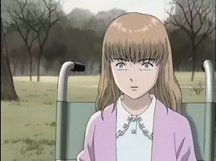
A catatonic Anna, being questioned by Weißbach
In 1986, Egon Weißbach was assigned to investigating the murder of the defected former East German trade advisor Michael Liebert and his wife in Düsseldorf, Germany and went to Eisler Memorial Hospital, where he attempted to question one of their surviving adopted twins, Anna, since her brother, Johan, was purportedly incapacitated from a gunshot wound he had mysteriously sustained to the head and was being treated at the hospital. However, Anna had initially disappeared and was found wandering around the hospital aimlessly, eerily and repeatedly muttering the word "kill." In spite of this, Inspector Wei ßbach would later attempt to question the catatonic girl in a less stressful environment, but words on her part were not forthcoming due to the trauma of the incident.
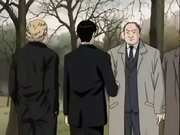
Inspector Weißbach meets Tenma in Udo Heinemann's funeral.
A few days later, the hospital director Udo Heinemann and his high-level functionaries Dr. Boyer and Dr. Oppenheim were also found mysteriously murdered, having apparently been deliberately poisoned by a muscle relaxant found in a bag of candy. Some suspicion for the murders fell on the twins' previous attending physician, the skilled neurosurgeon Dr. Kenzo Tenma, due to his recent demotion by Heinemann and his antagonism with the other two physicians over related issues, including the ostensibly inappropriate care the twins were receiving. In light of the recent rash of murders, the German Federal Police (BKA) became involved and the case fell under the purview of the zealous and obsessive Inspector Heinrich Lunge, much to the consternation of Weißbach due to sentiments of the BKA's perceived meddlesome bureaucracy and procedure by the local authorities. Nevertheless, he proceeded to introduce Lunge to Tenma following the director's funeral, with Lunge expressing considerable interest in Tenma and immediately suspecting his involvement, despite Weißbach's assertions that nothing beyond circumstantial evidence could be ascertained regarding the brilliant neurosurgeon.
Milan Koláš[]
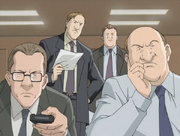
Weißbach watches the footage of Čapek's assassination attempt.
Several years later, Egon Weißbach was one of the police inspectors who worked on the case of the attempted murder of Petr Čapek by Milan Koláš in Frankfurt, shortly preceding his imminent retirement. When he learned that Koláš was a dentist from the resettlement area, he expressed some humorous hesitation at the idea of going to the dentist, because he doesn't want a lunatic working on his teeth.
Case of Reinhard Dinger[]
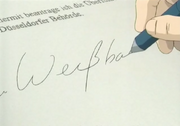
Weißbach's signing of custody transfer
Before Inspector Weißbach retired, he was assigned to handle the unrelated murders in Düsseldorf tied to the name of Reinhard Dinger. He requested the Düsseldorf Police to transfer the custody on him to the North Rhine-Westphalia station where he was designated. On the train going to their station, Weißbach and his partner conversed with Dinger, wanting to grasp the latter's thinking, and perhaps, personality.
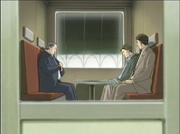
Weißbach and Dinger on the train.
Dinger declines to Weißbach's offer for a drink, but when he took out a cigarette to smoke, Dinger blurted out, "No smoking here." , rationalizing that the sign said it is non-smoking car. Weißbach commented on his morality and asked him how many people have his hands killed. Dinger pulled out his hands and started to count using his fingers.
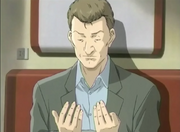
Dinger uses his fingers to count his victims.
Weißbach showed disgust at how lightly the man took other people's lives and just represent their number through his fingers.
Later, in that same train, Weißbach told Dinger that he was his last case, and that he was retiring the day after that. He confessed he led a simple life, and by his life's story he wanted Dinger to realise the lives he destroyed and wants him to regret all he has done.
Just then did Dinger spoke and asked him, "Even on those people who'd spit on me?" Dinger admitted that the man he picked on Adler street spit on him, and when Weißbach told him it was one shallow reason to kill, he countered, "Isn't spitting on someone the lowest thing a person can do?". Dinger then told Weißbach and his partner of the day he met and sheltered a couple of twins who looked like they had escaped an hospital.
When Weißbach and his partner and safely and successfully transported Dinger to the North-Rhine Westphalia station, he continued packing his things off his table in preparation for his retirement. Later, after remembering the story of Dinger and the twins, Weißbach asks Dinger if he remembered how the twins look like and he replies that "they had beautiful faces and were blonde". Weißbach then infers that those twins might be Johan and Anna Liebert.

Weißbach and Gillen interrogate Dinger about Johan.
Weißbach meets Rudy Gillen, who just interviewed Dinger as part of his research. Inspector Weißbach tells him about a child who became friends with Dinger and later became a monster. Weißbach and Gillen interrogate Dinger about who they suspect to be Johan. Dinger tells them that the man who ordered him to kill Fritz Overt just wrote Overt's name in a sandbox in a park in Griesheim. Weißbach and Gillen realize that the three men killed their latest victims because they were asked to by a young man who, most likely, was Johan Liebert.
